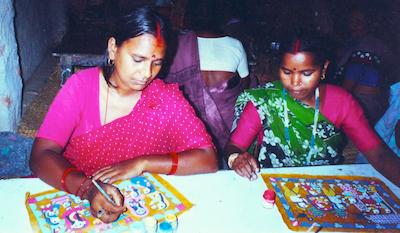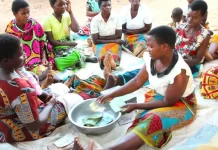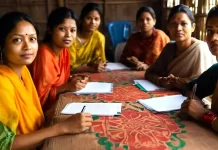
By SEEMA PARWEEN
Social entrepreneurs around the world have been working with innovative solutions to society’s most pressing social problems throughout years. In the same way social business entrepreneurs have started to implement and measure the social benefits of business in broad economic terms. And, yes, both types of entrepreneurs are ambitious and persistent, tackling major social issues and offering new ideas for wide scale change. Here is an story of an organisation from Nepal which is engaged in social business entrepreneurship to change women’s lives in rural Nepal.
Janakpur Handicraft Center (JHC) is an organization established some 20 years back in the city of Janakpur in Nepal. The aim of the organisation is to give as much as employment opportunities to women living in the villages nearby the city. Janakpur is a small town in the southern part of the Terai region (Mithila region) of Nepal, and also a Hindu pilgrimage site with legendary historical accounts. People living in this town are religious and conservative, and mostly live a very ordinary life.
Labor in Nepal is concentrated in agriculture, which provides a livelihood for over 90 per cent of the population. Outside of agriculture, avenues of employment include handicrafts, pottery, trade, military service, and government work. All these fields are limited in scope; however, many occupations are restricted to certain castes only.
Unemployment is widespread and many Nepalese have had to go abroad to make a living, either as soldiers, servants, or wage laborers.
See Also: Never Going Back Again: Two Home-Returned Migrants’ Entrepreneurial Journey in Nepal
In cities like Janakpur, the majority of agriculturalists are tenant farmers, and there are also large numbers of small owners and wage laborers. Agriculturalists cultivate very small plots, and their income is so meager that they are often forced into debt. Agricultural wage laborers find employment easily only in the peak seasons, and may be unemployed for most of the year. Women and children join in the farm work, except where strict Hindu custom restricts women’s participation. Among some tribes, women do most of the agricultural work.
In rural areas of Nepal, a woman has to do all household works and has to help her husband in the field work but beyond that she is not allowed to go out of her house for any other work. JHC believes that if a woman supports her husband in field then she can do any other works too and to eliminate poverty from the country, the root level people should be aware of the importance of empowerment and social rights. This is why, for years, JHC has been working to empower women in rural Nepal.
A popular concept these days, social (business) entrepreneurship is a way of using business to tackle social issues. Working as a social business entrepreneur, JHC has been supporting the economically backward and rural women by offering educative classes, conducting awareness and employment programs and providing them an opportunity to earn using their indigenous knowledge of art.
JHC has been focusing on changing the social attitude and practices prevalent in the society which are highly biased against women. This had been initiated by working with the women at the root level and focusing on increasing women’s access and control over resources and increasing their control over decision making. And, with the dedication of a few dozen women from different places, different castes and different social class, JHC has been producing Mithila arts and crafts in Janakpur. This is a scenario where women have used art to find a sense of independence.
Things have been changing already. For instance, nowadays, women like to ride a bicycle from work to home. They are supporting their families and sending their children to school so that they get a good education.
Nepal’s predominant patriarchal system doesn’t provide enough chances for women to have higher education even if they wish. But JHC is a platform where women can bring their ideas and questions to explore the world and teach each other. They work as a family and share their problems with each other. Whether it is an economic or moral support, women get in JHC and this is the reason they feel comfortable to join JHC.Women living in villages of Janakpur have great talents of arts and crafts. And JHC has helped women to earn through their own talents.
Still, women empowerment in countries like Nepal is a challenging task as we need to acknowledge the fact that gender based discrimination is a deep rooted social malice practiced in these societies for thousands of years. Women empowerment in Nepal is long drawn battle against powerful structural forces of the society which are against women’s growth and development.
Women empowerment initiatives are not always welcomed. Incase of JHC too, the conservative village society used oppose what JHC was doing blaming that they were spoiling the women in Janakpur. However, after years of hard work, dedication and consistent effort, people have started to realise the importance of self-dependency for women. There is an attitude which still prevails in Nepal where women are considered to be only worthwhile of household activities and managing the children.
Nepal’s highly unpredictable political climate has affected the women empowerment movement too. For instance, from 1994 to 2004, JHC had a good market and was supporting about 50 women workers at the center but due to the Maoist insurgency and Nepal’s unstable political situation, JHC’s outreach and activities declined in Nepal as well as abroad.
Since JHC got weak due to the bad situation of the country, the number of workers decreased from 50 to 20. But still JHC was working for the betterment of rural women. After 2007, JHC has again been trying to introduce itself back to the market so that it can be able to give job opportunities to many women in Nepal.
Today there are lots of things that are happening in the name of women empowerment in Nepal and a lot of resources are spent. Keeping this in mind it is crucial to have a reality check on what is happening on paper and what is the actual ground situation. It is worthwhile to ponder on the fact that Nepal is one of the worst countries in terms of worldwide gender equality rankings. This is why the process of women empowerment has been so slow in Nepal.
Women’s empowerment cannot take place unless women come together and decide to self-empower themselves. Self empowerment should be all round in nature. Once this happens then we can think about galvanizing the system towards the direction of better health facilities, nutrition and educational facilities for women at a very large scale.
The journey of women empowerment is very long for any organization like JHC in Nepal but the real change will only be visible when social attitudes and norms change. Various issues that need to be addressed for improving overall conditions of the women in rural areas include making access to affordable cooking fuel for rural women, providing safe drinking water, sanitation, increasing decision making capacity among women, providing equal wages as that of men, ending their exploitation, improving the political participation of women, eradicating poverty among women, increasing the security of women who are engaged in agriculture as daily wage workers, providing affordable healthcare and nutrition and managing the risk of unwanted pregnancies, infections and sexually transmitted diseases.
(Seema Parween reported this piece for Global South Development Magazine’s From Kyoto to Copenhagen: Unsolved Climate Equations edition. This version has been edited to fix a few facts and to provide relevant links)










